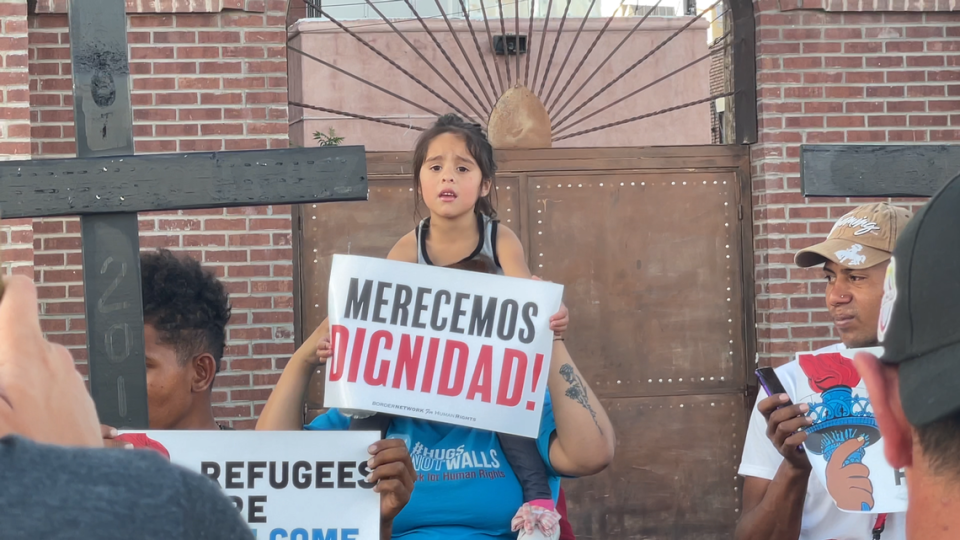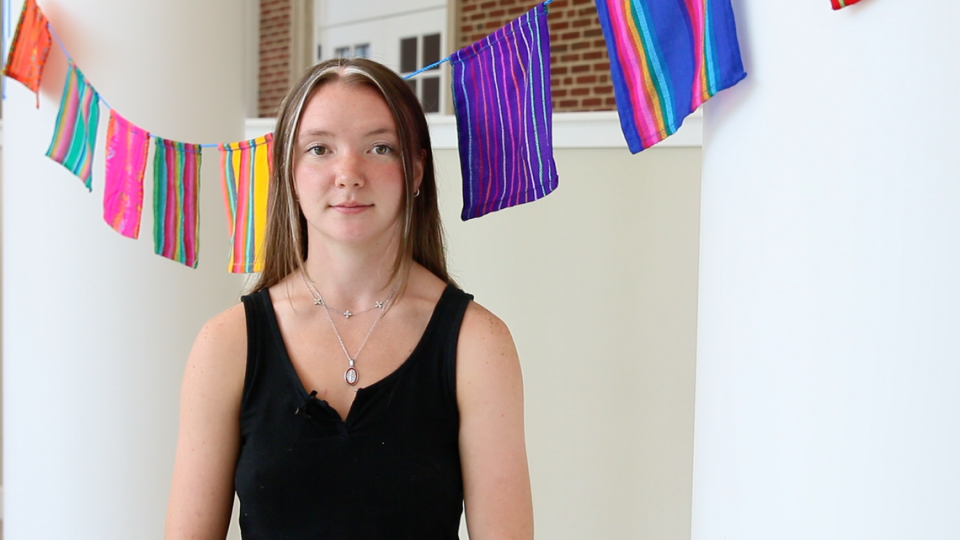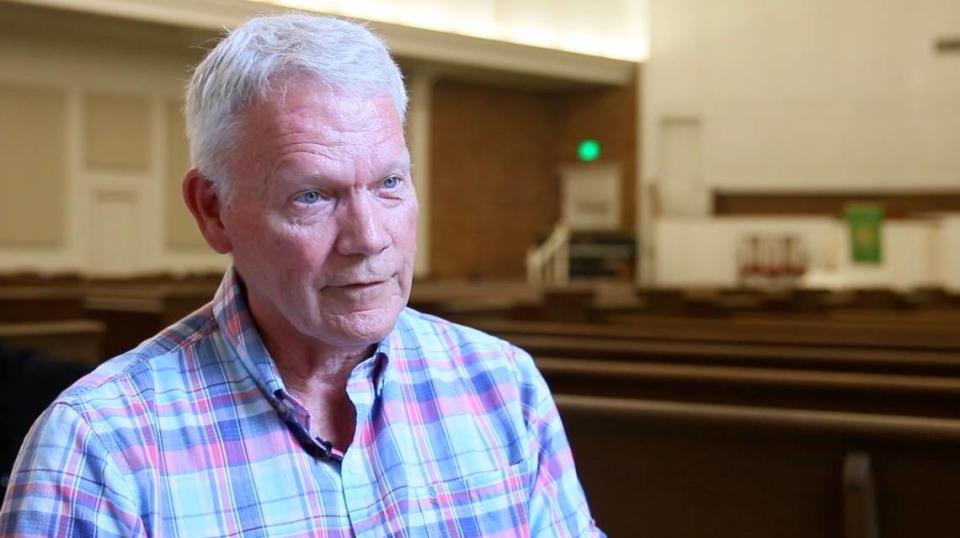Charlotte students visited migrants at the US border. It wasn’t what they expected.
After studying immigration issues for 16 weeks, a dozen students from Queens University of Charlotte visited the border in El Paso for five days in early May. It was a first-hand view how people are empowered by faith and how important it is in their journey to the United States.
Volunteers in El Paso and Charlotte said faith keeps families together as they walk, often barefoot, through miles of jungle. Faith provides comfort to immigrants who witness death, violence and trauma. Sometimes, it can be strong enough to guide congregations to sponsor families in cities like Charlotte.
Queens students were there on May 11, the Thursday when Title 42 COVID restrictions ended.
Earlier that week, we cleaned floors, sleeping mats and bathrooms; prepared and distributed meals; organized and distributed clothing; and played with children at the Sacred Heart Church in a shelter converted from a gymnasium. We had prepared for the experience in a class taught jointly by the university chaplain and a professor of political science.
When a dozen college students play with little kids, the unspoken language is joy. We played duck duck goose (pato pato ganso in Spanish), and for 30 minutes, it felt like elementary school recess for all of us.
In the shelter we met Jorvin, an immigrant in his late 20s from Venezuela. He left his country eight years ago and spent time in Peru, Chile, Bolivia, and Ecuador before crossing the Darien Gap between Colombia and Panama. Run by gangs and cartels, the gap is considered the most dangerous part of the journey. He told us that he was kidnapped by a gang in Mexico. In a series of random, life-and-death encounters, at one point he was held at gunpoint but released because that gang didn’t feel threatened by Venezuelans.
Spoken in Spanish, but translated Jorvin said, “I clung a lot to God at every moment that despite the fact that I was so hungry, so needy, in so much danger, he always guarded my life.” .
He started in a group of nine people. Four made it to El Paso. “I had the opportunity and I thank God for having arrived because not everyone arrives, not everyone achieves it.”
Volunteers are the heroes
We met at least two dozen volunteers from the Red Cross, the Sacred Heart Shelter, Jesuit Refugee Services, Mujer Obrera, Abara House, and others. These organizations provide shelter, clothing, toiletries, bus tickets, English language instruction, personal technology, counseling and other services and resources.
Volunteers are the heroes we never read about. Even though the organizations are not connected, it is striking to see how seamlessly their work flows together.
The City of El Paso estimates that 2,000 migrants arrive daily in the region. After going through U.S. Customs and Border Patrol processes, 50% or more are released to local non-governmental organizations and shelters, usually managed by non-profit and faith organizations. These organizations are funded by private donations and government grants, with volunteers doing most of the work.
While in El Paso, we saw the community gather outside of Sacred Heart Church to protest for human rights. They were joined together not by blood or by nationality, but by experience.
“It’s been a very tough struggle,” a Venezuelan protester told us. “We crossed seven countries to get here, besides a jungle. I lived in the jungle for three days because it was summer. It’s very hard, you know, it’s a jungle and many people pass through, children, adults, seniors.”
We learned that the border crisis is not just in the city of El Paso, but in communities like Charlotte. Diego Torres, an organizer for the Latin American Coalition, reports that his organization has served 963 newcomers, or 320 families, since January 2023.
‘Nuns Are Like Machines’
As domestic programs director for Jesuit Refugee Services in El Paso, Maria Sajquim de Torres is a clinical psychologist and program manager. She started working in an El Paso women’s center in 2000.
“When I was working there, I worked with nuns,” Sajquim de Torres said. “So I learned from them. The work that religious women do is incredible. They’re like a machine behind many things.”
The nuns worked countless hours daily and provided religious and mental health counseling to undocumented families.
“So I learned about them not only how devoted they are, for their work, but also about their spirituality,” she said. “I am a Catholic, I have these beliefs, this tradition, these practices, but I think that the work goes beyond it. Basically, if you’re talking about God, and the presence of God in your life, it goes beyond church or any religion.”
The Conversion of a Former Border Agent
Michael DeBruhl is director of the Sacred Heart Church Shelter in El Paso. He’s a retired border patrol agent who has focused on immigration issues for more than three decades.
“When COVID hit, I stopped working,” he said. “And then after that, I was really taken aback and could not abide by the kind of policies that were being put out at that time regarding how we treat immigrants, the way that we make them, all villains, etc.”
“I think there were there were a lot of untruths that were being put out to the general public. And so I really didn’t know what to do. So I just started volunteering,” DeBruhl said.
“What has been really incredible to me is that we are completely self-funded at this point,” DeBruhl added. When he started working at the shelter, he regularly worried about how long their financial resources could keep the place open – a month or two at best.
The generosity of people, foundations and groups has been the real surprise, he said.
“They’ve recently received donations for $50,000, $25,000 and $10,000, as well as storage space for supplies.” The shelter uses the money for building maintenance, toiletries, personnel, counseling, refugee assistance, and citizenship classes.
“Through the charity of others, we’ve been doing pretty well, actually,” DeBruhl said.
Families Provide Hope to Overcome Oppression
Hilda Villegas works for Mujer Obrera – “Working Woman” in Spanish — a Mexican café and gallery in El Paso that also sells traditional clothing in support of the community.
Villegas said the faith and values of extended Mexican families keep her in El Paso. They also provide hope, resources and community to help those passing through to survive and thrive. Mujer Obrera’s mission is to offer a creative space for women to express the dignity of their Mexican heritage.
“If you don’t have faith, or you don’t have anything to look towards … your oppression overwhelms you,” Villegas said. “And so a lot of the family’s resistance comes from having that.”
‘The Immigration System is Broken’
When I returned to Charlotte later in the summer, I learned about a Honduran family who came through El Paso 14 months ago. Their home had been demolished in a hurricane, and the mother and one infant child had been kidnapped by a gang and held for ransom. They escaped, and the family immediately made plans to leave the country. They spent a year at the border waiting to enter the United States legally, as asylum seekers.
In Charlotte, a former youth minister at Park Road Baptist Church heard about the family from Maria Sajquim de Torres – one of the volunteers we met in El Paso. The congregation made the decision to sponsor them.
When the family arrived in June 2022, current associate pastor Dan McClintock said the mother, father and three children got off the plane with everything they owned in one duffel bag. The church located housing, provided transportation, identified medical, dental, and legal support and helped with other resources.
The congregation had little previous experience sponsoring a family. McClintock said they learned that the legal system for asylum seekers is complex, involving work permits, driver’s licenses, and extensive government documentation. They realized that beyond the congregation, the Charlotte community has been extremely supportive. They learned about the limitations of public transportation, personal technology necessities, digital literacy, and learning English as a second language.
“It has really shown me that immigration is not just broken at the border,” McClintock said. “That’s what everybody talks about. But immigration is broken, the whole system is broken.”
McClintock suggests that other congregations should meet and talk with families who have experienced traumatic circumstances. For the Honduran family, the journey from their country has already taken three years.
“If people were able to understand really the difficult circumstances that these folks go through,” McClintock said, “they would be more sympathetic, empathetic and compassionate.”
Maggie Dineen is a junior at Queens University of Charlotte. She and 11 other students studied immigration and then visited El Paso in a program supported by the university’s Belk Chapel. Her journalistic and documentary work was supported by the Rogers Summer Institute.
A 3-minute video of the experience of Queens University of Charlotte students at the border in El Paso, with subtitles in English and Spanish, is available on the Youtube channel of the university’s James L. Knight School of Communication.



